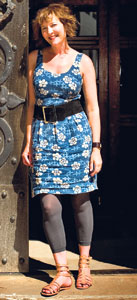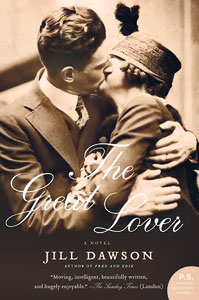According to Jill Dawson “Novelists thrive on the gaps in a story, the murky places that only imagination can illuminate.” Some of her most recent books straddle the porous line between fact and fiction: her novel ‘The Great Lover’ fictionalises the life of the poet W.B. Yeats once described as ‘the handsomest young man in England.’ Except her Brookes, bisexual, hyper-intelligent and mercurial, seems an altogether different person from the young idealist who penned the lines ‘If I should die, think only this of me: That there’s some corner of a foreign field/That is for ever England…’
A previous novel, ‘Fred & Edie’ was based on the historic murder trial of Thompson and Bywaters, and was shortlisted for both the 2000 Whitbread Novel Award and the 2001 Orange Prize for Fiction and voted one of 50 essential novels by a living author.
Though her career began as a poet (she won an Eric Gregory Award in 1992), she also the author of four other novels: ‘Trick of the Light’ (1996); ‘Magpie’ (1998), for which she won a London Arts Board New Writers Award;); ‘Wild Boy’ (2003) and ‘Watch Me Disappear’ (2006).
She has also edited several books for Virago, including ‘The Virago Book of Wicked Verse’ (1992),‘The Virago Book of Love Letters’ (1994), ‘Wild Ways: New Stories about Women on the Road’ (1998) and ‘Gas and Air: Tales of Pregnancy and Birth’ (2002). She is the author of one book of non-fiction for teenagers, ‘How Do I Look?’ (1991), which deals with the subject of self-esteem.
Jill has taught creative writing for over 20 years and is the founder and director of Gold Dust Mentoring Writers, which matches new writers with established ones.
Her next novel, ‘Lucky Bunny’ is due for publication in 2011. “I’ve always been drawn to people who like to make mischief,” she says, speaking of novel’s protagonist, Queenie Dove. “I wanted to create a character who does things in a more direct way, using mischief and daring, rather than sex, to achieve her goals,” she explains, confessing to a fascination with audacious heist and the ultimate con.
(Jill Dawson is sponsored by the British Council.)
What are you
reading?
I’m ploughing through all the novels of Richard Yates. I almost never write in the third person (I usually choose a first person voice) and I love the simplicity and honesty of his style, and I want to look at how he does it. Plus they are often excruciatingly painful and funny at the same time, a combination I love.
Where do you like to read?
Same as everyone else probably - I like to read in bed, and the bath!
When did you first come across the love letters of Edith Thompson? What about them inspired you to create ‘Fred & Edie’?
I was editing a book of Love Letters for Virago in the mid 90s when I came across Edith Thompson’s letters. I was fascinated by them - they seemed extraordinarily frank and erotic for the time - 1922. Not quite how we imagined people spoke at all.
I remembered reading about the famous trial of Edith Thompson and Bywaters in 1923 (they were jointly accused and later hanged for murdering her husband) but I hadn’t realised how much the letters played their part. The public was scandalised by what she wrote and judged her very harshly because of them.
Your fascination with letters carried over to those of poet Rupert Brooke - what did they reveal about the man himself? Why did you opt to place him in a work of fiction instead of a biography?
Yes, letters were the inspiration behind my novel The Great Lover, too. I do find letters interesting because they are of course written with only one recipient in mind – they can be quite unguarded and they often - but not always – are in a colloquial style, natural and close to a spoken voice.
In Brooke’s case his letters reveal the wonderful elasticity of his prose and how he had a number of different personas - for his mother, his friends, his girlfriends, his patron..... For instance there is quite an explicit letter written and sent to his friend James Strachey, describing in detail (I think it was designed to arouse poor James who had a crush on Brooke) the poet’s first sexual encounter with a man.
I included it in full because I could just imagine readers saying: Rupert Brooke would never have written that! It seems to me that original documents such as letters endlessly show how wrong our preconceptions might be about the language, vocabulary, conventions and ideas of another time. As for why I didn’t write a biography…..that requires a long answer, really, to do it justice.
I’m hoping I might get to talk a little about that at the festival. The short answer is that my skills are as a novelist. I like making things up. Can I make someone live and breathe, feel real, on the page? That’s the challenge I set myself.
Your novel ‘Watch Me Disappear’ had entire lines from Nabokov’s ‘Lolita’ and ‘The Enchanter’ embedded in the text. The novel was praised for its handling of pre-pubescent sexuality – what would you say, if anything, you learned from Nabokov?
I couldn’t bring myself to read ‘Lolita’ when I was younger, and even now I find it a disturbing novel, although full of extraordinary language and imagery.
The way in which everything about the girls in it is eroticised, you know, right down to their bobby socks, is very troubling. But it seems to me that Nabokov has a clear moral position towards Humbert. In the scene when he finally sleeps with Lolita (Dolores), Humbert, narrating, justifies it by suggesting that she seduced him.
This is in fact what pedophiles and sex abusers endlessly do – shift the blame to the victim - so in that sense it felt to me like an accurate portrayal of such a man.
What I wanted to convey – and hope I did – in Watch Me Disappear is that just because girls might have sexual feelings or some awareness of their own sexuality from quite early in adolescence it doesn’t follow that adults therefore have the right to molest them, or that girls themselves are in any way to blame for sexual attacks that might happen to them.
Young girls today live in very sexualised times. They may dress provocatively or use sexualised language – and after all, our culture bombards them with this stuff from very early in their lives - but I still think it’s ludicrous to suggest that they are therefore somehow responsible for the sexual behaviour of adults – men - towards them. It is an adult’s responsibility to act like one.
Your newest creation, the audacious Queenie Dove, is a woman who likes to make mischief. Though there are so few of them, who would you consider the foremost among her literary predecessors?
You’re right, there aren’t that many. Becky Sharp from ‘Vanity Fair’ or Moll Flanders, perhaps. I love Moll Flanders.
But Queenie decides early on she’ll use her wits, not her body to get what she wants and in that sense she’s not like those two. |




